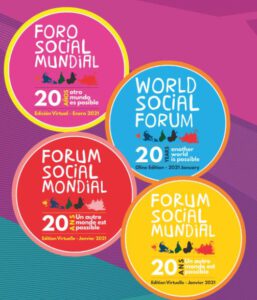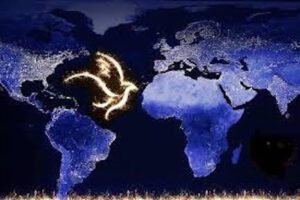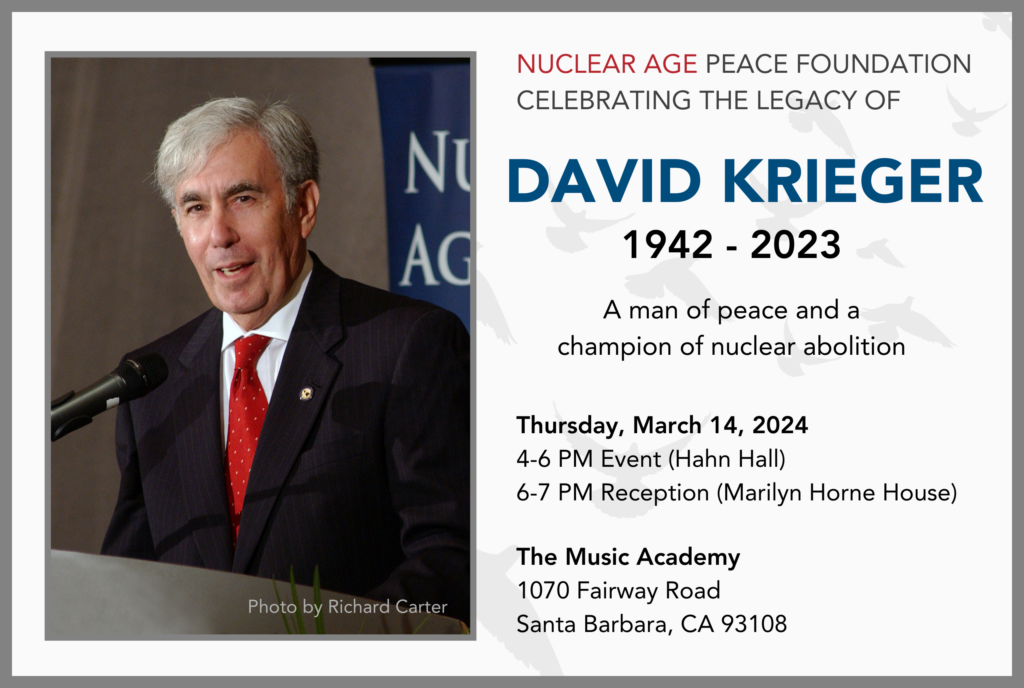Celebration of David Krieger’s Legacy on March 14th
|
| Sent via ActionNetwork.org. |
A great heart of peace has stopped beating.
On the death of David Krieger 1942-2023.
Throughout his life, David Krieger was an ardent and tireless campaigner for a world without nuclear weapons. In 1982, he founded the Nuclear Age Peace Foundation, of which he was President until 2019. He was involved in many small, large and international anti-nuclear events and activities.
In 1981, he was involved in the founding of the International Network of Scientists and Engineer, which he served as president in the 1990s and 2000s and whose development into an international network of scientists for responsibility and peace he significantly influenced. As a mentor, he promoted the development of this network for decades
His texts, but especially his deeply humanistic poems, influenced the development of many young people.
He was closely associated with IPB in the common rejection of the madness of nuclear weapons.
Personally, it was a pleasure to work closely with him in positions of responsibility over the years. His will to change, his argumentative strength and persuasiveness, his perseverance and patience, but also his insistence on never giving up characterized our close cooperation. His friendliness and charm made every conversation and discussion with him a lasting element of our joint work.
We are losing a good friend.
The global peace movement must mourn the loss of a tireless fighter and campaigner for a world without nuclear weapons. Bertold Brecht’s words apply to him: the strongest fight for a lifetime, they are indispensable. We will miss him, but we will continue to work in his spirit for a world free of nuclear weapons.
Reiner Braun, former President of the IPB and Executive Director of INES from 1991 to 2001 and member of the Board of Directors until 2006
Kristine Karch, board member of INES, co-chair international No to NATO network
SPACE: THE USA HAS SOME QUESTIONS TO RUSSIA. WHILE RUSSIA HAS MORE QUESTIONS TO THE USA
By Vladimir Kozin – Member, Russian Academy of Military Sciences )Moscow) On November 15, 2021, the Russian Ministry of Defense carried out the successful destruction of the discontinued and decommissioned national spacecraft named “Tselina-D”, which was put into orbit back in 1982. The head of the Russian Defense Ministry, Sergei Shoigu, confirmed that the Russian Aerospace Forces had indeed successfully destroyed this satellite system with the pinpoint accuracy. Pinpoint accuracy The fragments formed after knocking out this spacecraft do … Continue reading →
International group of scientists and academics issues urgent call to ban missile defense and space weapons !!
View the full report and the executive summary of the report II MBMDS REPORT RELEASE ON-LINE EVENT AT THE 2021 IPB CONRESS BARCELONA, SPAIN 16 OCTOBER 2021 7:30 – 9 pm (CEST) Preliminary Program Claus Montonen: Chair Introduction of INES, the report, and the panelists for the event Panelists: Subrata Ghoshroy: A brief description of the contents of the report and the recommended next steps Jürgen Scheffran: A few words about the 2002 INESAP report and the … Continue reading →
Ten years after Fukushima: The experts examine lessons learned and forgotten
By Ali Ahmad, Aditi Verma, Francesca Giovannini | March 11, 2021
A decade later, the footage of the dramatic hydrogen explosions in the Fukushima Daiichi nuclear power plant, broadcast live on television—and the subsequent disruptions to livelihoods, ecosystems, and economic activities—still reverberate.
10 years after Fukushima: Are Japanese nuclear power plants safe?
By Jun Tateno | March 10, 2021
https://thebulletin.org/2021/03/10-years-after-fukushima-are-japanese-nuclear-power-plants-safe/
Fukushima today: A first-person account from the field and the conference table
Fukushima today: “I’m glad that I realized my mistake before I died.”
By Thomas A. Bass | March 10, 2021
After the nuclear disaster at Fukushima, evacuees were put in what was supposed to be temporary housing built in parking lots and fields on the outskirts of inland towns. These metal structures were measured by the size of Japan’s traditional tatami sleeping mats, typically about 36 by 71 inches.
https://thebulletin.org/2021/03/fukushima-today-im-glad-that-i-realized-my-mistake-before-i-died/
2021/01/24 | 13-15 h UTC+1 ZOOM WEBINAR
Military: Environment and Climate Killer
Virtual World Social Forum (WSF) 23.-31. January 2021
 Military: Environment and Climate Killer
Military: Environment and Climate Killer
January 24th, 2021, at 13:00 – 15:00 CET (UTC+1)
Organized by Campaign Stopp Air Base Ramstein and International Network of Engineers and Scientists for Global Responsibility (INES)
Join: https://us02web.zoom.us/j/81327220855?pwd=WGd0MXJNeEg4VWFQaURVK2cyaHd1dz09
Speakers:
- Claus Montonen (Finland), INES Board, University of Helsinki
- Tamara Lorincz (Canada), Canadian Voice of Women for Peace, IPB Council, No to NATO
Moderator: Karl Heinz Peil (Germany), Campaign Stopp Air Base Ramstein
Description:
This webinar will address the damages of military and military installations to nature and the environment. It will explore this issue from multiple angles and in several regions, with speakers from Europe, East Asia, and North America.
Remembering one who abhorred war – on the death of Jack Steinberger

aus Wikipedia: Jack Steinberger (am 23. Juli 2008 in Bad Kissingen) CC BY-SA 3.0
Born on 25 May 1921 in Bade Kissingen, Germany On 12 December, the physicist Jack Steinberger died at the age of 99. As a young man, he had to and was able to leave Germany during the fascist era. Persecuted again during the Mach Carthy era, he left the USA and was awarded the Nobel Prize in Physics in 1988.
Jack Steinberg’s life was marked by a deep and never-ending search for scientific knowledge and truth. His commitment to passing on his knowledge to the next generations was tireless.
For him, science was inseparably linked with social and individual responsibility. Alarmed by the atomic bombs dropped on Hiroshima and Nagasaki, he spent a lifetime in the peace movement. His goal, which he advocated tirelessly and fearlessly, was a world without nuclear weapons and war. He abhorred war from the bottom of his heart. This commitment brought him to the International Network of Engeneers and Scientists, of which he became a founding member and long-time supporter and sponsor. He was active for and with INES until his old age.
We will miss him and his activities in the future we will have to fight alone against nuclear weapons and war for a peaceful and just world.
Reiner Braun
Video: INES-Webinar Weapons in Space – Challenges to Peace and Security
October 14, 2020 https://youtu.be/f-6FoxwfBE4
2020/12/01 zoom webinar 12-1:30pm EDT | 18-19:30pm | 2am Tokio
Missile and Nuclear Insecurity in East Asiaced
 Global Peace and Insecurity: A Seminar Series
Global Peace and Insecurity: A Seminar Series
Fall 2020: Tuesdays: 12noon-1:30pm US EDT (12-13.30) | 18-19:30 CET
TUESDAY, DECEMBER 1: Missile and Nuclear Insecurity in East Asia
REGISTER HERE https://mit.zoom.us/webinar/register/WN_6Um61UbXTKOoGsI9NWOwNQ.
2020/11/24 zoom webinar 12noon-1:30pm EDT | 18-19:30 CET
What’s next for the US-India strategic partnership?
 Global Peace and Insecurity: A Seminar Series
Global Peace and Insecurity: A Seminar Series
Fall 2020: Tuesdays: 12noon-1:30pm US EDT (12-13.30)
TUESDAY, NOVEMBER 24: What’s next for the US-India strategic partnership?
Dr. George Perkovich: Olivier and Nomellini Chair, vice president for studies, Carnegie Endowment for International Peace, author of India’s Nuclear Bomb, co-author of Not War, Not Peace?
2020/11/17 zoom webinar 12noon-1:30pm EDT | 18-19:30 CET
Ten years After Fukushima: The Future of Nuclear Power in Japan
 Global Peace and Insecurity: A Seminar Series
Global Peace and Insecurity: A Seminar Series
Fall 2020: Tuesdays: 12noon-1:30pm US EDT (12-13.30)
TUESDAY, NOVEMBER 17, 6:00PM-7:30PM EST (Please note differnt time): Ten years After Fukushima: The Future of Nuclear Power in Japan
Speaker: Jun Tateno, Ph.D., Executive Director, Nuclear and Energy-Related Information Center (NERIC), Tokyo, Japan
REGISTRATION TO BE POSTED SOON.
2020/11/10 zoom webinar 12noon-1:30pm EDT | 18-19:30 CET
The Non-Proliferation Treaty at 50: A Mid-Life Crisis?
 Global Peace and Insecurity: A Seminar Series
Global Peace and Insecurity: A Seminar Series
Fall 2020: Tuesdays: 12noon-1:30pm US EDT (12-13.30) | 18-19:30 CET
TUESDAY, NOVEMBER 10: The Non-Proliferation Treaty at 50: A Mid-Life Crisis?
Speaker: Paul Meyer, Adjunct Professor, Simon Fraser University, Vancouver, Former Canadian Ambassador for Disarmament Continue reading →
2020/11/03 zoom webinar 12noon-1:30pm EDT | 18-19:30 CET
Climate Change and International Security
 Global Peace and Insecurity: A Seminar Series
Global Peace and Insecurity: A Seminar Series
Fall 2020: Tuesdays: 12noon-1:30pm US EDT (12-13.30)
TUESDAY, NOVEMBER 3: Climate Change and International Security
Jurgen Scheffran, Head of the Research Group Climate Change and Security, University of Hamburg, Germany
REGISTER HERE (https://mit.zoom.us/webinar/register/WN_uswbhX1aR-SnT-5fz57taQ).





.png)
.png)


